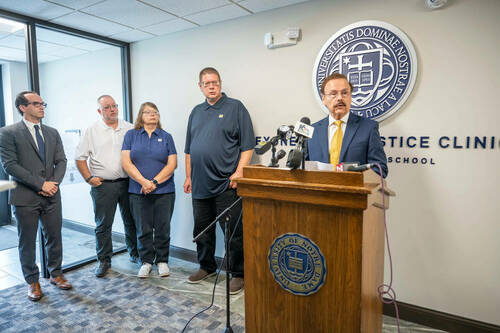
Andrew Royer is free — finally exonerated nearly two decades after he was charged with a crime he did not commit.
For years, Royer said that police had exploited his mental disability to coerce him into making a false confession in a 2002 murder case in Elkhart, Indiana. This week, the 46-year-old man was officially exonerated when a judge granted the Elkhart County prosecutor’s motion to dismiss the murder charge against him.
Royer is the first client of Notre Dame Law School’s new Exoneration Justice Clinic to be exonerated.
“We are not simply here to rejoice, to express our thanks for the fact that Andy has been released from prison, has regained his liberty, has been reunited with his family — that’s all wonderful, but what happens next?” said Professor Jimmy Gurulé, director of the Exoneration Justice Clinic. “And how can we ensure that this doesn’t happen again in Elkhart County?”
On Wednesday, Royer and his mother and stepfather, Jeannie and Michael Pennington, stood alongside the Exoneration Justice Clinic’s attorneys and students for a press conference in the clinic’s office on Howard Street in South Bend. With cameras and microphones on him, Royer seemed like a man who is finally able to set down a heavy burden.
“It’s been great,” Royer told a reporter who asked how his past year had been since leaving prison in 2020. “I had a lot of stress on me, but I’m a whole different person now.”
His parents seemed equally relieved, though the understanding that Royer had lost 18 years of his life to this wrongful conviction was a palpable undercurrent.
“We’re very thankful for the process that has taken place to bring Andy to this point today,” Michael Pennington said. “To bring his freedom back to him, and join our family and live the rest of his life in peace and comfort, and to know that he is exonerated.”

Jeannie Pennington added, “I was told right after he got in there by an attorney that he was innocent, that they could see it in his paperwork. It still took 17 years for him to be able to prove that, for him telling people, ‘I’m innocent,’ and no one listening.”
Royer spent 16 years in prison after he was wrongfully convicted in the strangulation death of an elderly woman who lived in his apartment building. Throughout his prison sentence, he maintained that Elkhart police had taken advantage of his disability in order to confuse him and pressure him into falsely stating that he committed the crime.
Royer’s confession was coerced, illegal and inadmissible, Gurulé said. He was interrogated for two days but only a small portion — 61 minutes in total — of his statement was recorded. Royer had no idea what he was doing, going so far as to ask, “Can I just go home now?” after falsely confessing to the crime.
Royer was released from prison in April 2020 when a special judge in Kosciusko County overturned his conviction and granted a petition for a new trial. The Indiana Court of Appeals affirmed the ruling in a 50-page opinion earlier this year. The opinion called officer testimony at Royer’s trial “particularly galling.” Elkhart Police Detective Carl Conway perjured himself during Royer’s trial, withholding the fact that he fed Royer details about the crime during his coerced confession. During the 2004 trial, Conway said he didn’t give Royer those details — which would be known only to someone who was at the crime scene — but in 2019 Conway admitted to doing so.
“As we have explained, when law enforcement officers lie under oath, they ignore their publicly funded training, betray their oath of office and signal to the public at large that perjury is something not to be taken seriously,” the Court of Appeals opinion stated. “This type of conduct diminishes the public trust in law enforcement and is beneath the standard of conduct to be expected of any law enforcement officer.”
In Wednesday’s press conference, Royer’s attorney and Notre Dame Law Adjunct Professor Elliot Slosar said the exoneration was about being joyful about Royer’s exoneration and reflecting on the miscarriage of justice, but also a reckoning for the Elkhart Police Department and Elkhart County Prosecutor’s Office.
“Andy and his family have waited 18 years for him to have his name back, for this nightmare to be over,” Slosar said. “When the state dismissed our case, our prayers were collectively answered.”
Slosar detailed Royer’s case, outlining that Royer didn’t have a chance at a fair trial from the very beginning — from the coerced confession, where detectives fed Royer what to say, to paying a witness an undisclosed $2,000 after she falsely testified against Royer and his co-defendant Lana Canen. Prosecutors also put a fingerprint expert on the stand who had no such training, Slosar said — something that led to the exoneration of Canen in 2012. Not only did this officer identify the fingerprint to the wrong person, but the print he claimed was a left pinky finger was in fact a right index finger print.
The June 2021 prosecutor’s motion to dismiss the murder charge, now granted by the presiding judge, marks the end of Royer’s long fight for freedom.
Notre Dame Law School faculty and students have worked on Royer’s case since 2017. Students have been involved at every stage of the process to overturn his conviction, including conducting early investigations, drafting a successive petition for post-conviction relief, participating in an evidentiary hearing and drafting the respondent’s appellate brief and preparing for the appellate oral argument.
“Andy would not be free, and we would not be here, but for the tireless work of Notre Dame Law students, our investigator and attorneys who were determined to correct the ultimate miscarriage of justice — the wrongful conviction of an innocent person,” Slosar said.
Royer’s conviction is the fifth person from Elkhart to be exonerated of serious criminal charges. Gurulé said that’s a shocking number for a city with a population of about 50,000 people. He and Slosar called for the firing of Conway, the officer involved in Royer’s coerced confession, as a starting point, adding that Royer was certainly entitled to compensation for his time spent wrongfully behind bars.
“It’s taken 18 years to get here, but we are confident that it’s finally come to an end. These charges should have never been filed against Andy in the first place, and we finally think this nightmare for Andy and his family has come to an end,” Gurulé said.
Originally published by at law.nd.edu on July 22.
